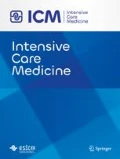Abstract
Objective
To assess the ability of physicians with varying degrees of experience to predict the length of stay and outcome of intensive care unit (ICU) patients.
Design
Prospective, interview-based study.
Setting
A 31-bed mixed medical-surgical ICU.
Patients
A total of 223 consecutive patients (excluding those admitted for routine post-operative surveillance) admitted to the ICU.
Interventions
None.
Measurements and main results
Physicians immediately responsible for each patient, and others fully aware of the case, were interviewed separately during the first 12 h of ICU admission to determine their assessment of the patient’s likely duration of stay on the ICU and the probable outcome. Degree of predictive accuracy was assessed using the Kappa statistic with kappa ≤0.2 poor, 0.21–0.4 fair, 0.41–0.60 moderate, 0.61–0.8 good, and 0.81–1.0 very good. Physicians were graded according to their degree of experience as junior (less than 1 year ICU experience), medium (critical care fellow), and senior (staff physician with supervising functions). For lengths of stay less than 5 days, senior physicians were better predictors than less experienced doctors. For outcome prediction, physicians were generally moderately good at predicting death, with senior physicians tending to be more accurate than their less experienced colleagues (senior kappa 0.68, medium kappa 0.52, junior kappa 0.43).
Conclusions
Prediction of length of ICU stay was poor amongst all physicians in patients with a length of stay greater than 5 days. Experienced physicians were better predictors of ICU lengths of stay less than 5 days and, in contrast to some reports, of ICU outcome than their more inexperienced counterparts.

Similar content being viewed by others
References
Van den Berghe G, Wouters P, Weekers F et al. (2001) Intensive insulin therapy in the critically ill patient. N Engl J Med 345:1359–1367
Corwin HL, Gettinger A, Rodriguez RM et al. (1999) Efficacy of recombinant human erythropoietin in the critically ill patient: a randomized, double-blind, placebo-controlled trial. Crit Care Med 27:2346–2350
Knaus WA, Draper EA, Wagner DP, Zimmerman JE (1985) APACHE II: a severity of disease classification system. Crit Care Med 13:818–829
Le Gall J-R, Lemeshow S, Saulnier F (1993) A new simplified acute physiology score (SAPS II) based on a European/North American multicenter study. JAMA 270:2957–2963
Christensen C, Cottrell JJ, Murakami J, Mackesy ME, Fetzer AS, Elstein AS (1993) Forecasting survival in the medical intensive care unit: a comparison of clinical prognoses with formal estimates. Methods Inf Med 32:302–308
Kruse JA, Thill-Baharozian MC, Carlson RW (1988) Comparison of clinical assessment with APACHE II for predicting mortality risk in patients admitted to a medical intensive care unit. JAMA 260:1739–1742
Brannen AL, Godfrey LJ, Goetter WE (1989) Prediction of outcome from critical illness. A comparison of clinical judgment with a prediction rule. Arch Intern Med 149:1083–1086
Marks RJ, Simons RS, Blizzard RA, Browne DR (1991) Predicting outcome in intensive therapy units—a comparison of Apache II with subjective assessments. Intensive Care Med 17:159–163
Knaus WA, Harrell FE Jr, Lynn J et al. (1995) The SUPPORT prognostic model. Objective estimates of survival for seriously ill hospitalized adults. Study to understand prognoses and preferences for outcomes and risks of treatments. Ann Intern Med 122:191–203
McClish DK, Powell SH (1989) How well can physicians estimate mortality in a medical intensive care unit? Med Decis Making 9:125–132
Moreno R, Apolone G, Miranda DR (1998) Evaluation of the uniformity of fit of general outcome prediction models. Intensive Care Med 24:40–47
Woods AW, MacKirdy FN, Livingston BM, Norrie J, Howie JC (2000) Evaluation of predicted and actual length of stay in 22 Scottish intensive care units using the APACHE III system. Acute physiology and chronic health evaluation. Anaesthesia 55:1058–1065
Copeland-Fields L, Griffin T, Jenkins T, Buckley M, Wise LC (2001) Comparison of outcome predictions made by physicians, by nurses, and by using the mortality prediction model. Am J Crit Care 10:313–319
Tu JV, Mazer CD (1996) Can clinicians predict ICU length of stay following cardiac surgery? Can J Anaesth 43:789–794
Marik PE, Hedman L (2000) What’s in a day? Determining intensive care unit length of stay. Crit Care Med 28:2090–2093
Mould RF (1998) Introductory medical statistics. Institute of Physics Publishing, Bristol
Society of Critical Care Medicine Ethics Committee (1994) Consensus statement on the triage of critically ill patients. JAMA 271:1200–1203
Silverstein MD (1988) Prediction instruments and clinical judgment in critical care. JAMA 260:1758–1759
Murray LS, Teasdale GM, Murray GD et al. (1993) Does prediction of outcome alter patient management? Lancet 341:1487–1491
Barrera R, Nygard S, Sogoloff H, Groeger J, Wilson R (2001) Accuracy of predictions of survival at admission to the intensive care unit. J Crit Care 16:32–35
Suter PM, Armaganidis A, Beaufils F et al. (1994) Consensus conference organized by the ESICM and SRLF: predicting outcome in ICU patients. Intensive Care Med 20:390–397
Author information
Authors and Affiliations
Corresponding author
Rights and permissions
About this article
Cite this article
Gusmão Vicente, F., Polito Lomar, F., Mélot, C. et al. Can the experienced ICU physician predict ICU length of stay and outcome better than less experienced colleagues?. Intensive Care Med 30, 655–659 (2004). https://doi.org/10.1007/s00134-003-2139-7
Received:
Accepted:
Published:
Issue Date:
DOI: https://doi.org/10.1007/s00134-003-2139-7




